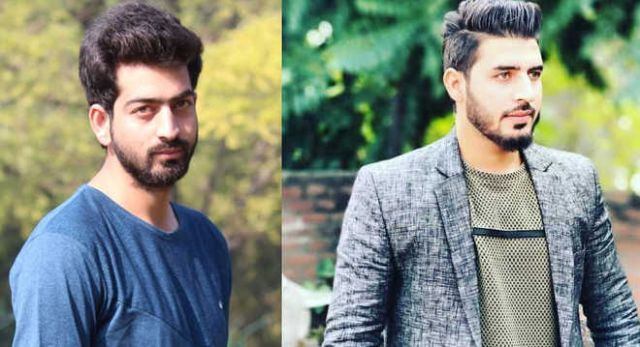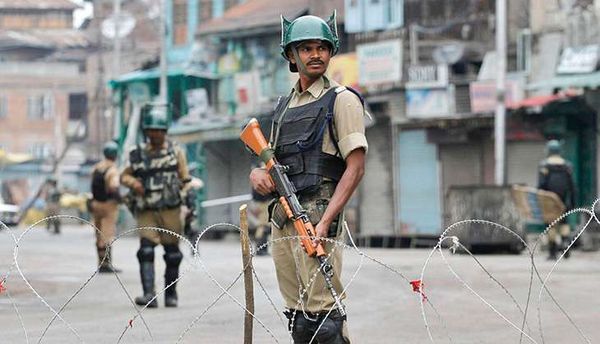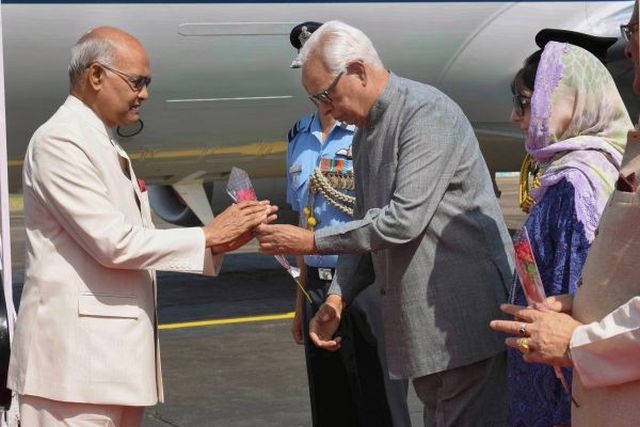
by admin | May 25, 2021 | News

Assistant Professor Muhammad Rafi Bhat
By Sheikh Qayoom,
Srinagar : He had a doctoral degree, a contractual job in the university and a bright future ahead in academics. He was married to a girl barely 20 years of age and was respected as a teacher.
“Soft spoken, humble and always ready to help,” was how he was described by his students in the Department of Sociology who said he never missed a class during his 18-month stint in college.
So how does a man like him go over to the dark side?
That’s the question that sociologists and politicians in Jammu and Kashmir are grappling with.
The death of 33-year-old Assistant Professor Muhammad Rafi Bhat in a gunfight between holed-up militants and security forces in Shopian district on Sunday defies logic.
Kashmir has seen any number of local youth being swayed by the cycle of violence. “But this is the case of a social scientist who is supposed to fully understand the dynamics of the society he lives in,” said a sociologist who did not want to be named. When something like this happens, it points to something seriously wrong with the society that we live in, the sociologist added.
Bhat came from a poor family in north Kashmir’s Chunduna village and going through his studies and getting a doctorate did not come easy to him. He served as a Class IV employee in the state’s Sheep Development Department to collect money for the books and journals he needed to complete his doctoral research.
Some 18 years ago he had made an attempt to join the militants, but was prevented by the secutiry forces from doing so. That must have been when he was a struggling teenager without too much of a direction in life. But what made him re-visit the folly of his younger days?
“A social scientist is the doctor to whom you take students and others to rationalise societal strains so that logical explanations are found to keep society in good health,” says Naeem Akhtar, senior ruling Peoples Democratic Party (PDP) leader and minister. Yet, if such a man chooses to end his life the way Bhat did, “we all need to understand where we are headed”, he added.
Bhat disappeared last Friday and was killed within less than two days of joining the militant ranks.
Just a few days before going over he had sold his car.
In his last phone call to his mother on Friday afternoon, he told her he would be home and also asked her if she needed anything from the city. He also told her not to worry if he reached home late.
The last call he made was to his father when the gunfight was raging in the Badigam village of Shopian district where he was trapped inside with Hizbul commander Sadam Paddar and three other militants.
“Forgive me if I have hurt you. I am going to meet Allah,” he said and the conversation between Bhat and his father ended.
His death has brought Kashmir face to face with a reality which is both intriguing and worrying. No easy answers seem to be coming forth.
(Sheikh Qayoom can be contacted at sheikh.abdul@ians.in)
—IANS

by admin | May 25, 2021 | News
 New Delhi : Delhi Police on Friday arrested two Kashmiri students from Punjab who were involved in hacking over 500 Indian websites, including those of the government, police said.
New Delhi : Delhi Police on Friday arrested two Kashmiri students from Punjab who were involved in hacking over 500 Indian websites, including those of the government, police said.
The accused have been identified as Shahid Malla, a CSE student at Aryan Group of College in Punjab’s Rajpura and Adil Hussain Teli, a BCA final year student at St. Soldiers Management and Technical Institute in Jalandhar.
They are natives of Baramulla and Anantnag districts of Jammu and Kashmir.
“Following a tip-off, Shahid Malla and Adil Hussain Teli were arrested on Friday when a team of Cyber Cell of Delhi Police raided their rented accommodation in Punjab,” a senior police officer told IANS on the condition of anonymity.
“During investigation, it was found that their online activities were part of anti-national hacking group called ‘Team Hackers Third Eye’ which has hacked more than 500 Indian websites, including some government websites,” the officer said.
The officer said the accused were also involved in educating Kashmiri youth to bypass state-imposed social media ban during April and May in 2017 by using VPN.
“During investigation, they were found continuously in touch with several Pakistani-based anti-Indian hackers while hacking the websites and sharing the personal information of government websites with them. Some of them are believed to be backed by Pakistani intelligence agencies,” he added.
“Through their seditious social media posts, Malla and Teli were found to be pro-Pakistan and anti-India,” the officer said, adding that some laptops, mobile phones, SIM cards, Internet dongles, memory devices and other instruments were recovered from their rooms.
The officer said the team was trying to ascertain their further plan and also their source of money. “The probe in underway.”
—IANS

by admin | May 25, 2021 | News, Politics

Giriraj Singh
Patna : Union Minister Giriraj Singh on Friday said as part of a sinister political design, attempts are being made to defame Hindus through the Kathua rape-murder case in Jammu and Kashmir.
Speaking at a function in Bihar’s Nawada, his parliamentary constituency, Singh said: “A conspiracy has been hatched to defame Hindus using the Kathua case. Some people with vested political interests are conspiring to divide the country.”
Blaming “pseudo secularism” for the conspiracy, the Union Minister of State for Micro, Small and Medium Enterprises said: “Some people are actively defaming Hindus in the name of secularism.”
Singh said earlier an attempt was made to defame Swami Aseemanand by linking him with Hindu terror or “Bhagwa Aatankwad”. “Now a fresh attempt is being made to defame Hindus through the Kathua case.”
He condemned the Kathua incident and demanded the arrest of the accused.
“But instead of arresting the real culprits, Hindus are being defamed,” he alleged and appealed to the youth to be alert to counter the forces opposed to the country.
Singh has constantly courted controversy for his statements. During the 2014 Lok Sabha election, he wanted all “those who want to oppose Narendra Modi” to “go to Pakistan”.
—IANS

by admin | May 25, 2021 | News, Politics
 New Delhi : With the Kashmir Valley enveloped by rising violence, the Indian Army on Friday said it would prioritize bringing radicalized youth to the mainstream through a “collective approach” and convince militants to “shun violence and gun culture”.
New Delhi : With the Kashmir Valley enveloped by rising violence, the Indian Army on Friday said it would prioritize bringing radicalized youth to the mainstream through a “collective approach” and convince militants to “shun violence and gun culture”.
The issue of conducting de-radicalizing exercises along with counter-terror operations in the Kashmir Valley was discussed during the ongoing biannual Army Commanders’ Conference that began here on Monday amid reports that Islamic State ideology was moulding new-age militants in the state.
“It was felt that priority must be accorded towards ushering peace by conducting counter-terrorist operations that minimize collateral damage. Radicalized youth must be brought into the mainstream by carrying out de-radicalization and collective approach that focuses on convincing the youth to shun violence and gun culture,” Director General Staff Duties Lt. Gen. A.K. Sharma told reporters.
Lt. Gen. Sharma, who earlier headed Nagrota-based 16 Corps in Jammu, didn’t explain what kind of exercise the Army would employ to de-radicalize Kashmiri youth who appear to be getting influenced by Islamic State ideology amid heightened violence in the Valley.
Staring at yet another possible hot summer with hundreds of militants and many civilians already killed in the first three and a half months of this year, dozens of youths in Kashmir have reportedly joined three prominent militant groups: Hizb-ul-Mujahideen, Lashkar-e-Taiba and a resurgent Jaish-e-Mohammad.
These groups have been historically linked to Pakistan and largely favour a merger of Jammu and Kashmir with Pakistan.
But new-age militants, including those from Ansar Ghazwat ul Hind of former Hizb commander Zakir Musa, have openly favoured pan-Islamism over nationalist goals, seeking “martyrdom or imposition of sharia” and declared jihad against not only India but “apostate” Pakistan too.
Though there is no concrete data available to prove the Islamic State’s physical presence in Kashmir, its online propaganda and the way it is influencing young Kashmiris indicate that the global terror group may have Kashmir ambitions at the very least.
Top Army commanders during the six-day conference that ends on Saturday also discussed the current situation along the borders with China and Pakistan, particularly “along the Line of Control, the increase in ceasefire violations and the adequacy of the response mechanisms”, said Lt. Gen. Sharma
“The apex commanders confabulated on the prevalent situation in the Valley and reviewed the recent developments affecting modus operandi of the operations of the armed forced deployed in the region,” he said, referring to the trend of civilians rushing to shootout sites to hurl stones at security forces in a bid to help militants escape.
The senior commanders, he said, also deliberated at length on the prevailing situation along the northern borders.
“During the conference, considerable time was spent on re-prioritizing the existing requirements to ensure that the resources allocated for force modernization and capacity building were utilized optimally with the budgetary allocation. The discussions also dwelt upon increasing the content of indigenization in force modernization.”
On the last day of the conference, the commanders would deliberate on matters pertaining “exclusively to military operations”, he said.
—IANS

by admin | May 25, 2021 | News, Politics

President Ram Nath Kovind being greeted by Jammu and Kashmir Governor NN Vohra on his arrival in Jammu on Wednesday. (PTI)
Jammu : Jammu and Kashmir Governor N.N. Vohra on Wednesday briefed President Ram Nath Kovind about the issues concerning internal and external security in the state.
The President is on a two-day visit to the state.
Vohra is hosting a dinner in honour of the President at the Raj Bhavan, where Kovind will spend the night.
According to an official statement, Vohra briefed Kovind about all the important issues relating to the state.
“Among other matters, Governor briefed the President about the external security situation; obtaining and emerging internal security environment; and status of various important socio-economic development schemes and programmes.
“The Governor also briefed the President on issues relating to the functioning of the administrative apparatus; growing incidence of corruption; impact of social media and enhancing radicalisation,” the statement said.
Challenges facing school education and the health sector also figured in the briefing.
The President attended a civic reception organised in his honour on the Amar Mahal lawns in Jammu city.
Before flying back to New Delhi, the President will visit the Mubarak Mandi heritage site in Jammu city on Thursday.
—IANS





